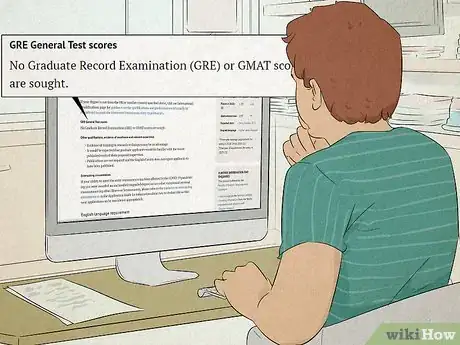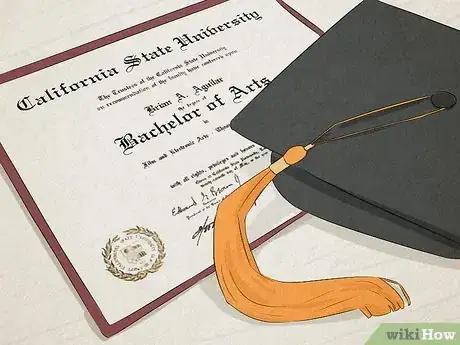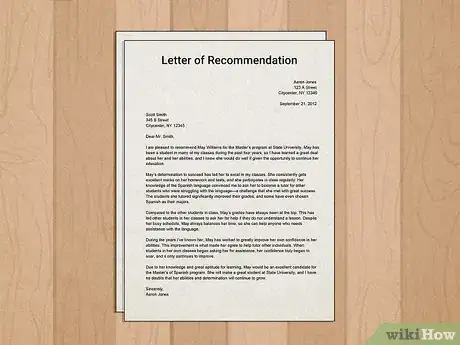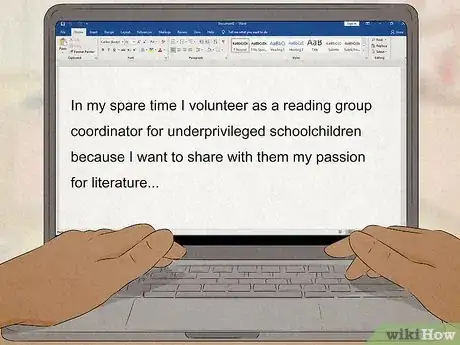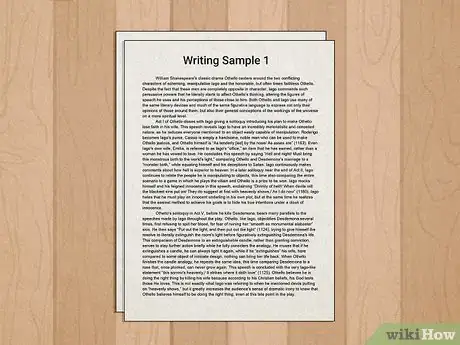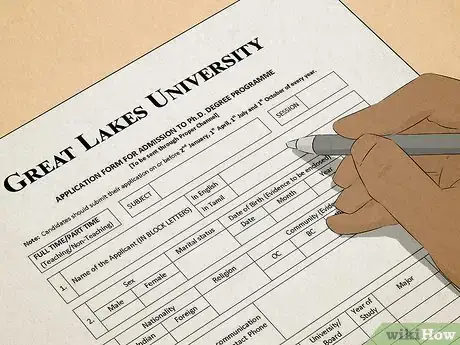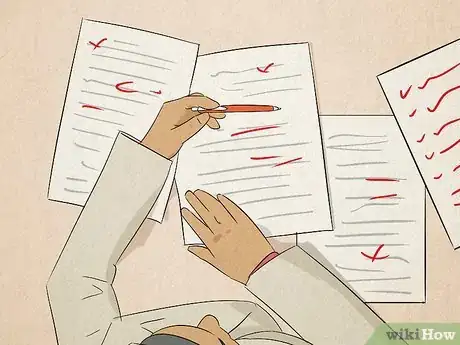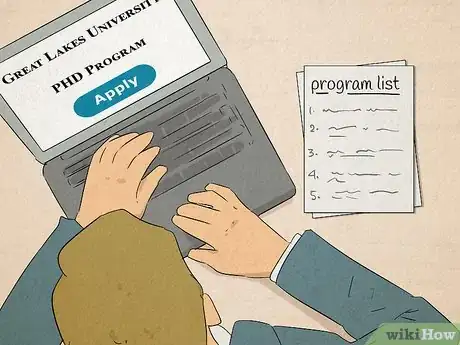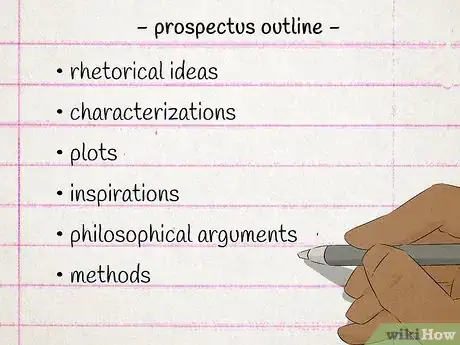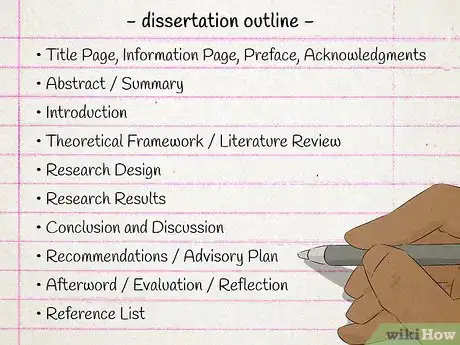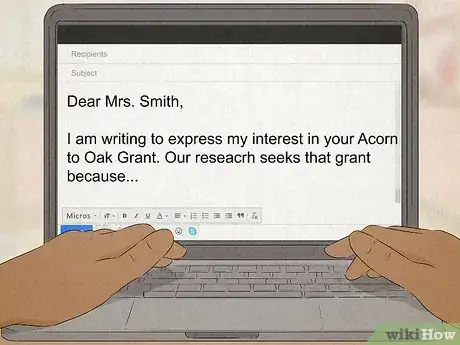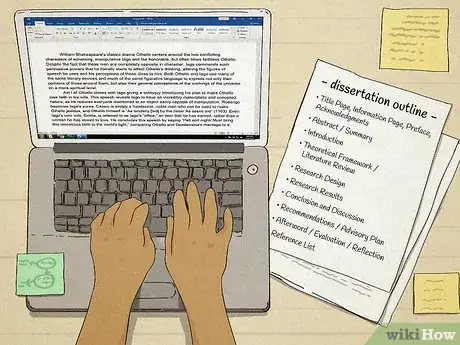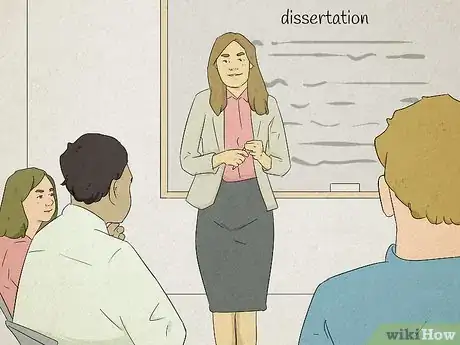This article was co-authored by Katherine Demby. Katherine Demby is an Academic Consultant based in New York City. Katherine specializes in tutoring for the LSAT, GRE, SAT, ACT, and academic subjects for high school and college students. She holds a BA in History and Political Science from the University of North Carolina at Chapel Hill and a JD from Yale Law School. Katherine is also a freelance writer and editor.
There are 21 references cited in this article, which can be found at the bottom of the page.
This article has been viewed 75,407 times.
Earning a doctoral degree in English/Literature can be one of the most rewarding and challenging courses of study one can undertake. This can be a lengthy endeavor with the time to degree of most programs similar to other humanities degrees--meaning a five-to-seven year commitment even if you enter with your Master of Arts (M.A.) degree. However, the breadth and depth of works you encounter--from ancient poems to modern novels--is an enriching experience.
Steps
Learning Prerequisites for Ph.D. Programs
-
1Take the Graduate Record Exam (GRE). You will need to take this nationally standardized test for entrance into any graduate program--master's or doctorate. The current GRE has a verbal, math, and essay section. Most humanities departments, such as English and/or Literature, will focus on the verbal and writing scores.[1] [2]
- Acquire a practice test and take some sample tests to help get a better score on the actual test.
- Check your prospective program's guidebooks, usually on the department's website, for average accepted scores, as the scoring scheme on these tests changes from time to time.
- GRE scores are valid for 5 years after the year in which you took the test. The year runs from July 1-June 30.[3] If your scores are more than 5 years old, you will likely need to retake the GRE.
- Submit the scores on your tests to the correct school(s) you are applying to during the actual test. You can order up to four scores at the time that you take the test. If you are applying to more than four programs, you will need to order additional score reports for a fee.[4]
-
2Check whether your chosen program requires the GRE Subject Test for Literature in English. Not all doctoral programs require this subject test, but many do. Check the website or contact your prospective program's graduate coordinator to find out whether you need to take this test. If you do, you will almost certainly need to take it in addition to the GRE General Test.[5]
- This subject test consists of about 230 questions that cover the full range of literature in English, including a few questions on important works of "world lit" that are routinely translated into English, such as Homer's Iliad or the Christian Bible.
- The test also covers basic knowledge about important cultural and historical contexts, as well as literary criticism.
- The subject test is only offered on paper and is only offered at certain times of the year, which means that you need to schedule your exam well in advance. Additionally, you should allow up to six weeks for your scores to become available to your chosen graduate program(s).[6]
Advertisement -
3Earn a master's degree in a related field. The humanities can cover a wide variety of subjects. You do not have to have a master's degree in English to apply for an English Ph.D. program, but you should consider getting your earlier degrees in topics related to English/Literature. Some Ph.D. programs will admit students directly from undergraduate programs, without requiring a master's degree first. You can investigate this option too.
- Look through your prospective master's program's degree offerings for an English and/or Literature department.
- Contact the graduate coordinator for the master's program you're considering to see if she recommends the program as a starting point for an academic career in English and/or literary studies. If not, she may be able to direct you to better departments or programs.
- Look into related fields like history, anthropology, philosophy, and theology for potential leads on programs and classes that will benefit your breadth and depth of study.
- If your master's degree is in a completely unrelated field, such as computer programming, don't despair. English is a very flexible field and welcomes people with all types of backgrounds.[7] However, you will need to carefully and convincingly explain why you want to do a Ph.D. in English and how your experience has prepared you for the program.
-
4Ask if there is a "fast track" in your current program. If you're already in a master's program for English/Literature, you might ask about staying at your current school for the doctorate degree. Some schools will allow students to combine some master's degree achievements into their doctorate program.[8]
- If you have a "fast track" option you can and want to pursue, ask your advisor if you're in a position academically to move onto it by your program's deadline. Some will admit you only if you intend to pursue a doctorate.
- Acquire an accurate list of the requirements of the doctorate program in comparison to your existing master's program. This likely means increased credit hours, differences between a thesis and a dissertation (the final written composition you will produce), and changes to your course selection.
- Even if you do not have a "fast track" option, you may investigate the choice of staying in your current school for the Ph.D. after achieving your master's degree. However, this may require a fresh application, just as if you were a new student to the school.
-
5Learn a language. Most humanities doctorate programs in the United States, English/Literature included, require at least reading knowledge of at least one foreign language. If you are considering a prestigious graduate program, you may need to demonstrate competency in two or three languages.
- If your thesis or dissertation involves incorporating multinational and older works, you may need additional languages beyond the program requirements.
- Check your prospective program's course lists for what languages are regularly offered.
- Get a schedule of when the official knowledge reading exams or equivalent tests are given each semester.
- Consult with your prospective program about their requirements for passage of the language credit, especially if a class or just an exam is needed to pass the credit.
-
6Write a thesis that can work for you later. The thesis is the major writing composition at the end of a master's degree. These projects, at least for the master of arts in English/Literature, are lengthy original works in poetry, fiction, drama, rhetoric and/or similar genres.
- Choose something that will inform your dissertation later. Don't "reinvent the wheel," as this will take you too long. Write about something that's already been done but look for new inspiration for your subject matter to write about or find a different angle within an established topic.
- Keep a portfolio of all your work. This will be helpful in applying for doctoral programs, teaching jobs, and/or other forms of employment should you pursue them.
Choosing a Doctoral Program
-
1Choose the right program for you. Look at your prospective schools' department lists to see if they have an English/Literature department.[9] You may want to take popular rankings systems, such as U.S. News & World Report's "Best Grad Schools," into account.[10]
- Take a close look at the faculty list of the top few programs you are most interested in and narrow down the list to professors that cover the sub-fields of English/Literature you are interested in.[11]
- Consider highly ranked schools first. Students who earn their doctorates from the top 10 programs are significantly more likely to find tenure-track positions after graduating.[12] Apply to the most prestigious programs you think you have a shot at. It is also wise to have a "fall-back school," which is well-ranked but more within reach.
-
2Contact the professor(s) that you want to work with most directly. This professor will most likely direct both your program of study and dissertation.
- Introduce yourself and your ideas for the theoretical project you would like to work on with this faculty member.
- Explain about the work you've already done, including compositions from your master's program. This is a good chance to engage the faculty member on literary, rhetorical, and pedagogical (teaching) ideas and see if you can form a good professional relationship.
- The professor you pair up with finally is frequently referred to as your "major professor" for various purposes. Sometimes they will also be called your dissertation director when that time comes.
- On rare occasions, major professors will leave a department/university for one reason or another. It is possible to still work with them remotely if you can get permission from your department/program. Otherwise, you will have to find another professor in the department to take you on.
-
3Visit the campus. If you've narrowed your prospective program choices down to just a handful, then physically going to them may help make your decision about where to spend the next few years it may take to get your degree.[13]
- Schedule time to meet with the professor(s) you may work with. See if you can at least with your potential major advisor to go over likely dissertation subjects, courses, and program expectations.
- Take a walk around the department. Find out what the other English, Literature, and Creative Writing professors and grad students are studying. They may contribute to your work and vice-versa.
- Find out if there are any writing clubs, literary workshops, poetry reading groups, book clubs or similar organizations that work with the department or university that could be of use to your topic. Get their contact information at the very least.[14]
- Ask to talk with current doctoral students in the program. Many graduate programs will organize informal lunches, dinners, or social times with current grad students so that you can ask questions about what their experience is like. These can be just as informative as speaking with the faculty, if not more so. Ask about the camaraderie of the department, work/life balance, and whether there are any "problem" faculty you should be aware of.
Preparing Your Application
-
1Gather letters of recommendation. You will need these for your applications to other graduate schools. These letters will, ideally, highlight your aptitude and work ethic, among other positive traits observed by those that know your work and character.[15]
- Try to give your chosen writers at least a month's advance notice so they can take their time writing the letter. Consider providing your writers with a copy of your curriculum vitae (C.V.) to help remind them of your work. Be transparent and let them know exactly what the letter is for and the school you intend to apply for. They can tailor the letter better for your needs.
- Pick writers that know your work, such as teachers and employers. Make sure you seek letters that include some from your master's program faculty--especially your thesis advisor. Your program may have specific requirements about who writes the letters.
- Choose not to see the letters before they are sent. Sometimes you are given the option of viewing sealed or unsealed letters before they are sent to where you apply, and some schools will invalidate the letters if they are unsealed. Additionally, requesting to examine the letter may seem as though you do not trust the sender. If the faculty member seems hesitant to recommend you, it is better to find someone else than take a half-hearted letter.
- Confirm with the school if the letters need to be sent from the university, on university letterhead, submitted electronically, or should be sent with your application packet.
- If there is a physical mailing involved, provide the properly addressed envelope and postage to your writers. If there is an electronic submission involved, make sure all the web addresses are correct, and get confirmations.
- If it's approaching the deadline and your recommenders have not provided their letters, it's acceptable to give them a polite reminder about your request for a letter of recommendation.
-
2Prepare your personal statement. Your personal statement, sometimes called a statement of purpose, is a major component of your application. It introduces you to the admissions committee and makes your case as to why you want to pursue a doctorate in English/Literature. You should prepare to write several drafts of this important document and get feedback from mentors. The personal statement may be anywhere from 500 words to two pages.[16]
- Discuss your academic background, research interests, and professional aspirations. If you have already conducted extensive research or have peer-reviewed publications, mention them here. Talk in detail about what you want to research and how the degree will further your career goals.[17]
- Mention specific attractions about the program to which you’re applying. For example, do they have an extensive rare manuscripts library? Is there a faculty member you are keen to work with? You don’t need to “suck up” to the committee, but making informed statements about why you want to study at each particular program will help convince the committee that you have prepared for the work ahead.[18]
- Avoid cliches. Do not talk about how you have always liked to read, or how you burn with a hard, gem-like flame for poetry. Do not use a dictionary definition or famous quote to open your essay. Convey that you are engaging with the field at a professional level.
- Show, don’t tell. Use specific examples whenever possible. For example, don’t say “I am passionate about literature.” Say “In my spare time I volunteer as a reading group coordinator for underprivileged schoolchildren because I want to share with them my passion for literature.”[19]
- Try to keep your writing polished but approachable. You don’t want to come across as stuffy, but you also don’t want to come across as unsuited for the rigors of a Ph.D. program.
-
3Prepare your writing sample. You will need to submit a writing sample to your doctoral program. This sample displays your intellectual abilities, the quality and rigor of your work, and your promise as a scholar. Ask for help from a mentor or faculty member in choosing what essay you will use as your writing sample.[20]
- You may be asked to prepare several writing samples, especially if you are applying to a doctoral program with a creative writing emphasis. Choose samples that reflect the variety of your work as well as the quality of it.
- Keep your sample to the length requested. If this means you have to cut chunks out of it, do so. Do not submit a sample significantly longer than requested. The committee may well simply stop reading it.[21]
-
4Brush up your CV. You will likely need to submit your CV along with your other application materials. If you are applying to the Ph.D. directly from your undergraduate degree, you may need to include some accomplishments from your high school years. If you are applying from your master’s program, make sure that you don’t include too much early stuff -- this can make it appear as though you are padding your CV. However, unlike with a traditional resume, the lengthier your CV, the better, so do not leave off important information.[22] Include the following sections:[23]
- Heading. This includes your name, address, and contact information
- Education. This includes your degrees, beginning with those in progress or most recently earned. Include the name of the institution, city/state, degree type and major, and the month and year the degree was (or will be) awarded. If you graduated with honors, it is acceptable to mention it. If you are coming from a master’s program, state your thesis title and advisor’s name.
- Relevant Experience. List positions that reflect your experience and expertise. If you have prior teaching or tutoring experience, highlight this, as you will likely need to teach to support yourself in the doctoral program. Include your job title, organization name, city/state, and the dates you held each position. Include a brief summary of your responsibilities. Don’t include non-academic jobs here.
- Publications. If you have already published research or creative work, list it here. If you do not have publications, you can title this section “Research Experience” and discuss any major research projects you have conducted or assisted with.
- Professional Presentations. If you have attended conferences or other professional events, list them here.
- Honors and Awards. List any competitive scholarships or fellowships you have received. You may also list scholastic honors and other awards.
-
5Fill out the application forms. Some will be printed, some will be online. Make sure you have mailing supplies (large yellow envelopes, postage stamps) if it's a print application. Make sure you have the correct browser software and settings according to the instructions if it's online.
- These can be large and detailed forms, so take your time. If it's a paper application, print a couple of copies in case you fill out something incorrectly and need to redo a page. Hold off stapling the pages until the end.
- For online applications, make sure you set aside plenty of time since they often are done in one sitting. Save your work frequently if possible.
- Use a large yellow envelope to mail your application materials to the university in the case of a print application. If you are unsure of the amount of postage you need, take the entire pack to your local post office and they will weigh it, let you know the postage amount, and mail it for you if request.
- Submit your application online if that is the method available.
-
6Proofread obsessively. Ask friends to proofread your application as well. Print out your documents and read them in hard-copy. You are applying to the highest-level degree in your field, and the admissions committee will notice minor errors. Sloppy proofreading suggests a lack of commitment.[24]
-
7Apply to several programs. You should consider applying to at least half a dozen schools, if not more. These departments can vary considerably in size and funding, so it's hard to predict how much competition you will be facing.
- Most programs will have fees associated with applying, so take that into consideration with the number of applications you submit.
- Be prepared that you may get staggered responses from your different applications. Some may accept, wait-list, or reject you earlier than others.
- If you are accepted or wait-listed fairly early, be alert to response deadlines since most programs are aware that students they accepted sometimes refuse admission. This may open up a position for a wait-listed student, but also may compel you to make a decision on one school that accepted you before others have responded.
-
8Submit transcripts from your undergraduate and master's program. Make sure they arrived at your prospective doctoral program by its application deadline.
- Some schools will have this service for free, some will have you pay for it. But to be official, they must be submitted by your school to the destination. Some schools will ask for copies from you in the interim, but those will be unofficial.
Completing the Required Coursework
-
1Choose your English/Literature specialization. The names of the major field may differ from school to school, but some examples of major concentrations include: medieval, Renaissance, Restoration and 18th century (British/American), 19th century (British/American), criticism, theory, race and ethnicity, gender and sexuality, and rhetoric.[25]
- Most universities require a major field to be taken along with several minor fields to improve a graduate's breadth of academic coverage. So you may focus on one area, but still take a few classes in others you weren't initially interested in.
-
2Pick a committee. These will be professors that lead your minor fields and consult for your comprehensive exams in addition to your major advisor. They may or may not continue onto your dissertation committee.
- Take classes with at least some of your committee members if possible. It will help them learn your work, and facilitate collegiality (professional friendship).
- Some universities require an "out of area" member--a professor from another department to ensure your department is not giving students a free pass. Ask your major professor who they recommend, or if you have a professor in mind, run the choice by your advisor first.
- Occasionally committee members will retire, move, or for whatever reason leave the department. If this happens you can arrange with your department to conduct academic business with them remotely, or consult the procedures to replace them.
-
3Consult with your advisors often. These professionals are the source of information and guidance throughout your program.
- Check with your department's academic advisor especially for administrative information and deadlines. Also the advisor can help make sure you're on time with fulfilling the required credits for your major and minor fields.
- Meet with your major professor frequently for guidance on theoretical ideas, professional development, and to make sure you are meeting program requirements in conjunction with the academic advisor.
- Check your program rules for how many credits you need for each major and minor concentration. You might want to keep your own chart in addition to the department's records.
- See if some classes "double count" for major and minor fields, two minor fields, etc., with your advisor. This can free up room to take other classes you need or might be interested in.
- Do not be averse to taking classes out of your "comfort zone." This can lead to helpful collaborations with other colleagues, introduce rich ideas into your work, and provide breadth and depth to your professional applications later.
-
4Select classes based on your major and minor fields. In most doctorate of English/Literature programs, a minimum of 2 years or 30 credit hours of full-time coursework is required for the degree beyond the master's degree. But this can vary widely.
- Pick mostly classes that also help your dissertation along with the writing that you will complete for them.
-
5Participate in teaching assistantships. Most graduate programs fund their students through assistantships of some kind. Frequently, teaching assistants provide grading or some other form of assistance to professors and the department on a part-time basis during the semester.
- Take advantage of opportunities to instruct a class if you get them. This will be practice for a teaching position should you get one, and experience you can put on a job application later. Note that even if you are the instructor of record, meaning you are entirely in charge of teaching the class, you will likely still be called a “Teaching Assistant.”
-
6Pass comprehensive exams. Most programs require students to pass a written and/or oral comprehensive exam to become a Ph.D. candidate, at which point all coursework is recognized as complete and only the dissertation remains for degree completion.
- Prepare for this test to cover the major and minor concentration fields. In some programs, you may get to choose which areas you take exams in. Other programs may have pre-established examination areas.
- Get questions or prepare with your committee members ahead of time.
- Expect the written essay parts to last several hours, whether in take-home form or on-site in a classroom/computer lab form. If you know graduate students that have taken exams from these professors before, you should consider asking them what to expect--but remember your experience could still be different, their experience should just be a guide.
- Oral exams typically involve the entire committee in the room together with you, asking you questions. This can be very intimidating, but typically you will not be allowed to enter comprehensive exams unless your major professor thinks you are ready. If at any point you are having serious questions, consult your major professor first.
-
7Consult with your major professor after passing the test. You should do this to plan your dissertation's development. Your status at this point frequently will be called "ABD" (all but dissertation).
- Discuss fellowship and grant funding opportunities for your dissertation work.
- Establish your dissertation committee, keeping in mind it may differ from your committee leading up to comprehensive exams. You should pick committee members that contribute to your work's theoretical framework, but also can help with the practical writing critique.
- Get an idea of time-frame for completion. This will likely change, but you should keep in mind your program's deadline to complete your degree requirements. Otherwise, you may need to retake your comprehensive exams or file an extension (to allow more time to complete the degree) with your university.
- Discuss other professional activities you might do while "ABD," including book reviews, conferences, teaching assistance, etc.
Completing a Dissertation
-
1Write a prospectus. Consult frequently with your major advisor about your work. Ideally, you can build off of ideas you generated earlier in your master's program and/or classes, but either way you will be doing a considerable amount of additional writing.[26]
- Outline your rhetorical ideas, characterizations, plots, inspirations, philosophical arguments, methods, and keep a list of works you may cite.
- Plan a more detailed time frame for completing each step of your dissertation including time to travel if needed to gather resources, when you might complete chapters, and potential defense dates.
- Explain how your work fits in genre of literature you seek to enter.
-
2Write an outline. Outline the dissertation itself including chapters, subheadings, and a works cited section. This will organize your thoughts, and keep your workload manageable.
- Consider dropping in headings of works you have already done as potential chapter titles
- Having sections to work on will allow you to more easily budget your time to work on the dissertation. You can work on a section, take a break, move onto another, and repeat.
- Ensure an overall theme or current of thought is running through these sections you are setting up. If you set this up in your outline, it will focus your ability to maintain coherent thoughts in the body of the dissertation.
-
3Look for funding. There are numerous funding opportunities for humanities and graduate students. Consult with your program's and college's listings as well as any academic societies you may belong to. These can be competitive, so look for and apply to multiple sources.[27]
- Find funding for the right stage of your work "pre-dissertation," while you're researching, and others while you're in the writing phase near completion.[28]
- Ensure that your project falls within the grant/fellowship scope, and write any application letters to argue for such a case.
- Make a note of deadlines and notification time frames as they tend to move from semester to semester and year to year.
- Check to see if you can satisfy the grant/fellowship commitments beyond your own work. Some will ask you to conduct lectures, present your progress, travel, etc...
-
4Research your dissertation. Like the thesis, this will be mostly original work. Bring in the work you used for your master's degree if applicable. Look for contributions that will enrich your content.
- Ask experienced writers for help on other techniques, plot devices, and/or writing strategies that might help your work along.
- Present work you do at conferences to get early feedback before it’s in the final form. You may also get ideas on more concepts you had not considered.
-
5Write your dissertation. Keeping a steady writing schedule can be extremely difficult, especially as one is likely to have other distractions from life crop up by the time the dissertation writing phase arrives.
- Try to write just a little each day, maybe a couple of hours. If you can't, then maybe set aside blocks of time you know you won't be disturbed on specific days.
- Shop around parts of what you write to your major advisor or graduate students at the same level of progress as yourself. Putting together a group of students at the dissertation phase can be mutually motivating.
-
6Defend your dissertation. Upon completion of the dissertation, each student meets with a dissertation committee--usually the major advisor, a few others from your department, and one "out of area" faculty member. If the committee approves the dissertation and defense, you will have completed the degree.
- Make sure you have consulted with your committee on a date and gotten a location for the defense. Frequently these defenses are budgeted to last two hours, but may be shorter.
- If one professor is abroad, see if teleconferencing them in is an option.
- Check with your college office/advisor to see if your dissertation has met all formatting requirements.
Expert Q&A
-
QuestionWhere can I get a PhD in English?
 Katherine DembyKatherine Demby is an Academic Consultant based in New York City. Katherine specializes in tutoring for the LSAT, GRE, SAT, ACT, and academic subjects for high school and college students. She holds a BA in History and Political Science from the University of North Carolina at Chapel Hill and a JD from Yale Law School. Katherine is also a freelance writer and editor.
Katherine DembyKatherine Demby is an Academic Consultant based in New York City. Katherine specializes in tutoring for the LSAT, GRE, SAT, ACT, and academic subjects for high school and college students. She holds a BA in History and Political Science from the University of North Carolina at Chapel Hill and a JD from Yale Law School. Katherine is also a freelance writer and editor.
Test Prep Specialist Most major universities will have a PhD program in English. You can't do this at a community college or anything like that, but the vast majority of the other institutions out there will have doctorate programs.
Most major universities will have a PhD program in English. You can't do this at a community college or anything like that, but the vast majority of the other institutions out there will have doctorate programs. -
QuestionWhat tests will I need to take to get into an English PhD program?
 Katherine DembyKatherine Demby is an Academic Consultant based in New York City. Katherine specializes in tutoring for the LSAT, GRE, SAT, ACT, and academic subjects for high school and college students. She holds a BA in History and Political Science from the University of North Carolina at Chapel Hill and a JD from Yale Law School. Katherine is also a freelance writer and editor.
Katherine DembyKatherine Demby is an Academic Consultant based in New York City. Katherine specializes in tutoring for the LSAT, GRE, SAT, ACT, and academic subjects for high school and college students. She holds a BA in History and Political Science from the University of North Carolina at Chapel Hill and a JD from Yale Law School. Katherine is also a freelance writer and editor.
Test Prep Specialist It depends on the program, but you'll almost always have to take the GRE. That's basically the entrance exam for most post-undergraduate programs. Depending on the program you may also have to take the GRE subject test in English literature to demonstrate your knowledge in the field.
It depends on the program, but you'll almost always have to take the GRE. That's basically the entrance exam for most post-undergraduate programs. Depending on the program you may also have to take the GRE subject test in English literature to demonstrate your knowledge in the field. -
QuestionWhat is the TOEFL and why is my local university making me take it?
 Katherine DembyKatherine Demby is an Academic Consultant based in New York City. Katherine specializes in tutoring for the LSAT, GRE, SAT, ACT, and academic subjects for high school and college students. She holds a BA in History and Political Science from the University of North Carolina at Chapel Hill and a JD from Yale Law School. Katherine is also a freelance writer and editor.
Katherine DembyKatherine Demby is an Academic Consultant based in New York City. Katherine specializes in tutoring for the LSAT, GRE, SAT, ACT, and academic subjects for high school and college students. She holds a BA in History and Political Science from the University of North Carolina at Chapel Hill and a JD from Yale Law School. Katherine is also a freelance writer and editor.
Test Prep Specialist The TOEFL is for folks who don't speak English as a primary language. It's basically a language fluency exam that demonstrates you have a solid grasp on the mechanics of English.
The TOEFL is for folks who don't speak English as a primary language. It's basically a language fluency exam that demonstrates you have a solid grasp on the mechanics of English.
Warnings
- Make sure any professor you are contacting is actually taking new doctoral students that semester. If you are unsure, that initial contact period is a good time to ask--though most department websites should list this information.⧼thumbs_response⧽
- Official Transcripts usually must be sent directly by schools, so keep in contact with your prospective programs to make sure they received them and nothing was lost in transit.⧼thumbs_response⧽
- Classes on course offerings are not always offered every semester. Make sure the ones you need will actually be there. If not, ask about independent study.⧼thumbs_response⧽
- Humanities doctoral degrees are a long process, especially due to class credit hour requirements and writing requirements involved in the dissertation. If you simply have a general interest in literature, it may not be enough to sustain your pursuit of an advanced degree and career. You should be able to identify specific fields of interest and avenues for employment when proceeding with the degree.⧼thumbs_response⧽
Things You'll Need
- Bachelor's degree
- Master's degree
- Graduate Record Exam
- Postage stamps, large yellow envelopes (if using a print application)
References
- ↑ http://www.ets.org/gre
- ↑ Katherine Demby. Test Prep Specialist. Expert Interview. 17 December 2020.
- ↑ http://www.ets.org/gre/revised_general/faq/#faq601
- ↑ http://www.ets.org/gre/revised_general/scores/send/
- ↑ Katherine Demby. Test Prep Specialist. Expert Interview. 17 December 2020.
- ↑ https://www.ets.org/gre/subject/faq/?viewfaq=faq4
- ↑ Katherine Demby. Test Prep Specialist. Expert Interview. 17 December 2020.
- ↑ http://www.english.ucla.edu/academics/graduate
- ↑ http://study.com/articles/List_of_Schools_with_the_Best_English_Masters_Programs.html
- ↑ http://grad-schools.usnews.rankingsandreviews.com/best-graduate-schools/top-humanities-schools/english-rankings
- ↑ http://www.english.northwestern.edu/people/faculty/
- ↑ https://www.insidehighered.com/news/2015/01/08/economist-offers-critique-job-market-phds-english
- ↑ http://www.cornell.edu/visit/
- ↑ http://krieger.jhu.edu/fields/english/
- ↑ http://english.fas.nyu.edu/object/english.grad.phd.info
- ↑ https://twp.duke.edu/sites/twp.duke.edu/files/file-attachments/personal-statement-humanities-1.original.pdf
- ↑ https://twp.duke.edu/sites/twp.duke.edu/files/file-attachments/personal-statement-humanities-1.original.pdf
- ↑ https://spu.edu/depts/eng/documents/APPLYINGTOGRADUATESCHOOL--SPU.pdf
- ↑ https://spu.edu/depts/eng/documents/APPLYINGTOGRADUATESCHOOL--SPU.pdf
- ↑ https://spu.edu/depts/eng/documents/APPLYINGTOGRADUATESCHOOL--SPU.pdf
- ↑ https://twp.duke.edu/sites/twp.duke.edu/files/file-attachments/personal-statement-humanities-1.original.pdf
- ↑ https://owl.english.purdue.edu/owl/resource/967/02/
- ↑ http://www.grad.illinois.edu/sites/default/files/pdfs/cvsamples.pdf
- ↑ https://twp.duke.edu/sites/twp.duke.edu/files/file-attachments/personal-statement-humanities-1.original.pdf
- ↑ http://english.princeton.edu/graduate/program
- ↑ http://english.yale.edu/graduate/requirements
- ↑ http://www.neh.gov/grants
- ↑ https://www.acls.org/programs/dcf/


